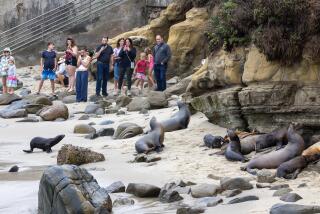Raising a Stink Over Skunk, Possum Traps
- Share via
Some residents of a Huntington Beach neighborhood are outraged over their homeowners association’s plan to trap and remove wild skunks and opossums.
The trapping, set for Monday, is smack in the middle of the animals’ birthing season and could leave a host of motherless young, opponents said this week.
Unless the association board agrees to postpone the trapping or release of captured animals to relocation societies, homeowners say they will call in animal rights protest groups they have already contacted.
Why, residents wonder, can’t people and animals just get along?
“With all the new building, where do [the animals] go?” asked Joan Lasher, who has lived in SeaCliff on the Greens since 1986. “God put them on the Earth for some reason.”
The neighborhood of 186 townhouses backs up to the wildlife-rich Bolsa Chica wetlands. It is also an island in a sea of new development, development that is driving critters out of their homes and into the area.
“When you buy a home near a natural area, it’s something you have to expect,” said Connie Boardman with the Bolsa Chica Land Trust. “It’s just going to become more and more of a problem as we continue to develop natural areas and the animals are forced into smaller and smaller habitats.”
The homeowners association board wrote in a recent newsletter that skunks stink and carry rabies, possums are “nature’s garbage disposal,” and both have to go. Board members would not comment further, except to say they feel the trapping is necessary.
Resident Margaret Clark, who has been leading the campaign to save the skunks and opossums, said the board told her the animals must be removed because of liability if an animal should attack somebody. Board members would not say if any attacks have occurred, Clark said, and she knows of no such incidents.
Board members also told her they would not release trapped animals to relocation societies, nor would they identify the trapper to be employed, Clark said.
Homeowners associations do not need a permit to do the trapping, state officials said, as long as the animals are killed or released within the same county.
Jackie Garcia of the local chapter of the Opossum Society, a national organization, said most trappers euthanize the animals. And trapping may be ineffective anyway, she said: “It leaves that area open, and more [animals] will move in.”
People may inadvertently attract wild animals, she said, by leaving pet food outdoors at night. Her organization educates people about how to live peacefully with the animals, she said, but the SeaCliff association has not requested such service.
Further, the trapping plan is not unpopular with all residents. Dennis Peters says he has been troubled by possums for about 10 years.
“They hiss at you, and you jump about three feet off your seat,” he said. “They poop in the yard . . . and smash snails all over the patio.”
He said he is also worried that his grandchildren might have an unpleasant encounter with a skunk.
Peters said the animals should stay in the wild--and most of Orange County is not wild anymore.
Wildlife and human populations have clashed often as Orange County has grown. Hundreds of wild rabbits at Seal Beach’s Leisure World narrowly escaped being shot in May after some people complained that the neighborhood was being overrun. A public outcry persuaded city officials to call off the hunt. The rabbits were so abundant, wildlife experts said, because the area’s predatory foxes had been removed.
More to Read
Sign up for Essential California
The most important California stories and recommendations in your inbox every morning.
You may occasionally receive promotional content from the Los Angeles Times.













